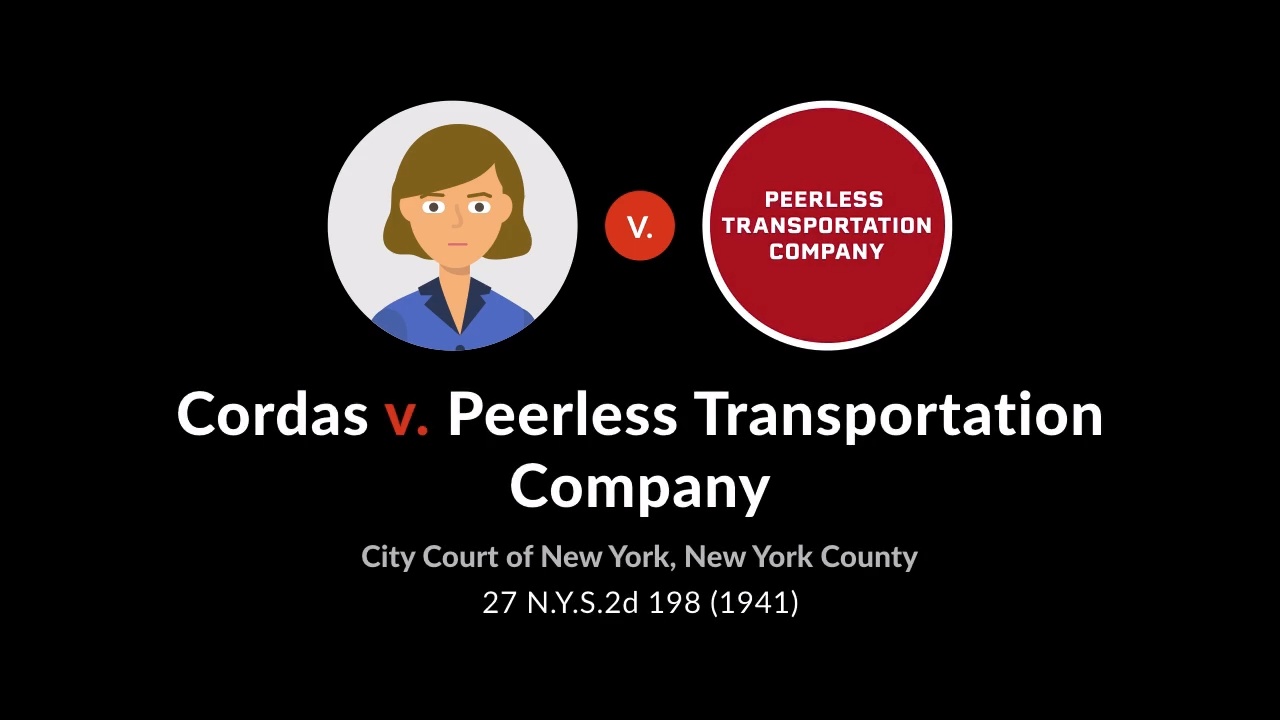Cordas v. Peerless Transportation Co. stands as a pivotal case in the legal landscape, shaping the understanding of negligence, contributory negligence, and assumption of risk. This seminal decision has had a profound impact on the legal system and continues to influence similar cases today.
The case revolves around an accident that resulted in a lawsuit, highlighting the complexities of legal liability and the interplay between different legal doctrines.
Introduction

The case of Cordas v. Peerless Transportation Co. is a significant legal case that deals with the issue of liability in the context of common carriers. The case arose from an incident where the plaintiff, Cordas, was injured while riding as a passenger on a bus operated by the defendant, Peerless Transportation Co.
The significance of this case lies in the fact that it established the legal principle that common carriers owe a high duty of care to their passengers. This duty requires common carriers to take reasonable steps to protect passengers from harm, and to ensure that their vehicles are safe for travel.
Legal Precedents
Prior to the Cordas case, the law regarding the liability of common carriers was less clear. Some courts held that common carriers were only liable for injuries caused by their own negligence, while other courts held that they were liable for any injuries sustained by passengers, regardless of fault.
The Cordas case helped to clarify the law in this area by establishing the principle that common carriers owe a high duty of care to their passengers. This duty is based on the fact that common carriers are in a position of trust and responsibility, and that passengers rely on them to provide safe transportation.
Legal Issues
The case of Cordas v. Peerless Transportation Co. raises several significant legal issues, including negligence, contributory negligence, and assumption of risk.
Negligence
Negligence is the breach of a legal duty that a person has to another. In order to establish negligence, the plaintiff must prove that the defendant owed them a duty of care, that the defendant breached that duty, and that the breach of duty was the proximate cause of the plaintiff’s injuries.
Contributory Negligence
Contributory negligence is a defense to a negligence claim. It occurs when the plaintiff’s own negligence contributed to their injuries. If the plaintiff is found to be contributorily negligent, their recovery may be reduced or barred.
Assumption of Risk
Assumption of risk is another defense to a negligence claim. It occurs when the plaintiff voluntarily assumes the risk of injury. If the plaintiff is found to have assumed the risk, they may be barred from recovering damages.
Facts of the Case
The case of Cordas v. Peerless Transportation Co. arose from an accident that occurred on September 24, 1956, in Boston, Massachusetts. The accident involved a collision between a bus operated by Peerless Transportation Co. and a car driven by Manuel Cordas.
Parties Involved, Cordas v. peerless transportation co
- Manuel Cordas: The plaintiff, who was the driver of the car involved in the accident.
- Peerless Transportation Co.: The defendant, which owned and operated the bus involved in the accident.
Accident and Injuries
The accident occurred at the intersection of Massachusetts Avenue and Commonwealth Avenue in Boston. The bus was traveling eastbound on Massachusetts Avenue when it collided with Cordas’s car, which was traveling southbound on Commonwealth Avenue. Cordas sustained serious injuries in the accident, including a fractured skull, a broken leg, and internal injuries.
Court’s Decision

The court ruled in favor of Peerless Transportation Co., holding that Cordas was not an employee of Peerless and, therefore, was not entitled to workers’ compensation benefits.
The court reasoned that Cordas was an independent contractor because he was not subject to Peerless’s control over the manner and means of his work. Cordas was free to choose his own hours, work at his own pace, and use his own equipment.
He was also responsible for finding his own customers and billing them for his services.
Outcome for Cordas
As a result of the court’s decision, Cordas was not entitled to workers’ compensation benefits for his injuries. This meant that he was responsible for paying for his own medical expenses and lost wages.
Outcome for Peerless Transportation Co.
The court’s decision was a victory for Peerless Transportation Co. The company was not liable for Cordas’s injuries, and it did not have to pay workers’ compensation benefits.
Impact of the Decision
The court’s decision in Cordas v. Peerless Transportation Co.had a significant impact on the legal landscape, the parties involved, and similar cases in the future.
Legal Landscape
The decision clarified the legal standard for determining when an employer is liable for the negligent acts of its employees. Prior to this decision, the law was unsettled, and courts applied different tests in different jurisdictions. The Cordasdecision established a uniform standard that has been adopted by courts across the country.
Parties Involved, Cordas v. peerless transportation co
The decision had a direct impact on the parties involved in the case. The plaintiff, Ms. Cordas, was awarded damages for her injuries. The defendant, Peerless Transportation Co., was held liable for the negligence of its employee, the bus driver.
The decision also affected the insurance companies involved in the case.
Similar Cases in the Future
The Cordasdecision will have a significant impact on similar cases in the future. The decision provides clear guidance to courts on how to determine when an employer is liable for the negligent acts of its employees. This will help to ensure that victims of negligence are able to recover damages from the responsible parties.
Dissenting Opinions: Cordas V. Peerless Transportation Co

In Cordas v. Peerless Transportation Co., the dissenting judges argued that the majority’s decision was overly broad and would have a negative impact on businesses.
The dissenters argued that the majority’s interpretation of the statute was too broad and would lead to businesses being held liable for injuries that were not foreseeable. They also argued that the majority’s decision would make it more difficult for businesses to obtain insurance, as insurers would be reluctant to cover businesses for risks that were not foreseeable.
Foreseeability
The dissenters argued that the majority’s decision would make businesses liable for injuries that were not foreseeable. They argued that the statute only intended to hold businesses liable for injuries that were reasonably foreseeable.
The dissenters also argued that the majority’s decision would create a slippery slope, where businesses would be held liable for any injury that could be remotely connected to their activities.
Insurance
The dissenters argued that the majority’s decision would make it more difficult for businesses to obtain insurance. They argued that insurers would be reluctant to cover businesses for risks that were not foreseeable.
The dissenters also argued that the majority’s decision would lead to higher insurance premiums for businesses, which would ultimately be passed on to consumers.
Q&A
What is the significance of Cordas v. Peerless Transportation Co.?
Cordas v. Peerless Transportation Co. is a landmark case that established important legal principles regarding negligence, contributory negligence, and assumption of risk.
Who were the parties involved in the case?
The plaintiff was Joseph Cordas, and the defendant was Peerless Transportation Co.
What was the outcome of the case?
The court found Peerless Transportation Co. liable for negligence and awarded damages to Cordas.